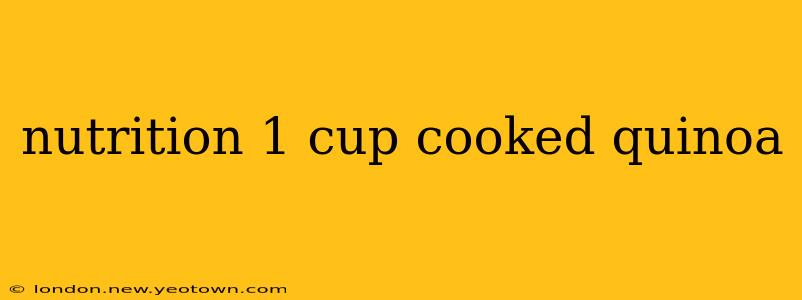The Nutritional Powerhouse in Your Bowl: Unpacking the Goodness of 1 Cup Cooked Quinoa
Quinoa. That fluffy, slightly nutty grain that's become a staple in health-conscious kitchens worldwide. But what exactly is in that seemingly simple cup of cooked quinoa, and why is it so popular? Let's dive into the nutritional details and explore why this ancient grain deserves its place on your plate.
My journey with quinoa started years ago, when I was researching healthier alternatives to rice and pasta. I was immediately drawn to its versatility and the whispers of its incredible nutritional profile. Since then, I've incorporated it into countless meals, and I'm excited to share what I've learned.
What are the Macronutrients in 1 Cup of Cooked Quinoa?
One cup of cooked quinoa (about 185 grams) packs a surprising punch. Let's break down the macronutrient composition:
-
Protein: Around 8 grams. That's a significant amount for a grain, making quinoa a great option for vegetarians and vegans looking to boost their protein intake. This protein is also a complete protein, meaning it contains all nine essential amino acids our bodies can't produce on their own.
-
Carbohydrates: Approximately 39 grams. While carbs are often demonized, quinoa's carbs are primarily complex carbohydrates, providing sustained energy release, unlike the quick sugar rush from refined carbohydrates. This sustained energy release is crucial for maintaining consistent energy levels throughout the day.
-
Fat: Roughly 2 grams. The majority of this fat is healthy unsaturated fat, contributing to overall heart health.
This balanced macronutrient profile makes quinoa a fantastic choice for fueling your body and supporting various metabolic functions.
What are the Micronutrients in 1 Cup of Cooked Quinoa?
Beyond the macronutrients, quinoa boasts an impressive array of micronutrients crucial for optimal health:
-
Fiber: A significant source of both soluble and insoluble fiber, contributing to digestive health and helping to regulate blood sugar levels. Fiber also plays a crucial role in promoting feelings of fullness, aiding in weight management.
-
Iron: Important for carrying oxygen throughout the body and preventing anemia. While not as high in iron as red meat, quinoa is a decent source, especially important for vegetarians and vegans.
-
Magnesium: Essential for muscle and nerve function, blood sugar control, and blood pressure regulation.
-
Manganese: A key mineral for bone health, wound healing, and metabolism.
-
Phosphorus: Vital for strong bones and teeth, as well as energy production.
-
Zinc: Supports immune function and wound healing.
Is Quinoa Gluten-Free?
Yes! Quinoa is naturally gluten-free, making it a safe and delicious option for those with celiac disease or gluten sensitivity. This is a crucial point often sought after by many consumers.
How Many Calories are in 1 Cup of Cooked Quinoa?
One cup of cooked quinoa contains approximately 222 calories. This calorie count varies slightly depending on the cooking method and brand, but it remains a relatively low-calorie, high-nutrient food.
What are the health benefits of eating quinoa?
The health benefits of quinoa are numerous and well-documented. From aiding in weight management due to its high fiber and protein content to supporting heart health through its healthy fats and magnesium content, quinoa's versatility and nutritional density make it a valuable addition to a healthy diet.
In conclusion, that seemingly simple cup of cooked quinoa is a nutritional powerhouse, brimming with essential nutrients that support overall health and well-being. Its versatility in the kitchen, combined with its impressive nutritional profile, makes it a worthwhile addition to any diet. So, go ahead and enjoy the nutty flavor and remarkable benefits of this ancient grain!

